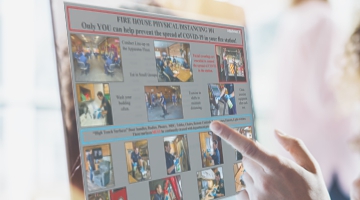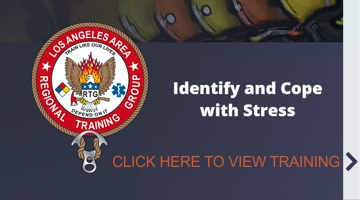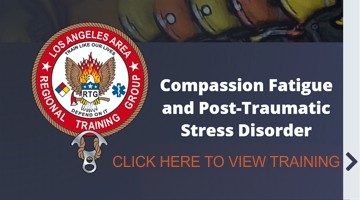COVID-19 Safety Stand Down Checklist of Considerations

Now more than ever is the time to stay vigilant. Do not let your guard down.
- COVID-19 PPE may be around for an extended amount of time and is a part of our safety equipment. Embrace it. Do not push away from it.
- We all have a responsibility not to spread the virus to others, including co-workers and community members.

Lead by example. We owe this to our communities.
- Wear a face mask.
- Practice good hygiene.
- Maintain social distancing.

Comply with health directives, especially in the fire station. Firefighters do not live in a bubble and can become spreaders if not cautious.
- Stay tuned to changing protocols.
- Include COVID-19 updates in fire station lineups and regular training.

Assume that anyone of us could be contagious at any moment. Take the precautions so that if we find out that we have COVID-19, we would not have spread it to our co-workers.
- Report all exposures.
- Report any symptoms.
- Isolate yourself following an exposure or if you are experiencing symptoms.

Take care of your mental and physical health.
- Exercise regularly.
- Maintain a good diet.
- Get sufficient rest.
- When stressed, do not hesitate to talk to someone. Some valuable resources are listed below.

Documents to Download and Read, Videos to View
- LACoDPH – COVID-19 Best Practices from On-Site Assessment at the Firehouses/Ambulance Quarters-Shared Living Houses
- LACoFD – Redoubling Our Efforts to Keep Each Other Safe – OA-19
- LACoFD – Keeping Each Other Safe Guidelines
- LACoFD – Fire House Physical Distancing 101
- LACoFD – COVID-19 ICP and Rehab Directives
- LACoFD – Donning and Doffing Video
- LAFD – COVID-19 Hygiene Precautions Video
- LAFD – COVID-19 Station and Apparatus Sanitizing Procedures Video
- CDC – What Firefighters and EMS Providers Need to Know about COVID-19
- CDC/NWCG – Prevention and Management of COVID-19 During Wildland Fire Operations
- HRTF – Guidance for First Responder Interaction with Suspected Confirmed COVID-19 Patients
- CA STAC – COVID-19 – Precautions, Protocols, and PPE For First Responders
RTG Behavioral Wellness: Identify and Cope with Stress
Stress ad behavioral health issues are significant factors in firefighter’s wellness. They impact physical fitness and present a serious risk to other-on-the-job hazards. Behavioral health challenges do not indicate weakness or unfitness. Lifelong health and wellness depends on self-awareness and taking positive action to manage stress.
View this important training.
RTG Behavioral Wellness: Compassion Fatigue and PTSD
Fire service work grows more demanding each year. Behavioral health issues among firefighters are also increasing. Higher suicide rates among firefighters have been observed. More than 100 US firefighter suicides occur each year, more than line-of-duty deaths. Behavioral health issues present significant risks to firefighter health and well-being.
View this important training.
Firefighters, Mental Health, and PTSD
In a national anonymous survey conducted by the IAFF and NBC, 7,000 respondents revealed a culture where many are trying to cope with mental health and PTSD. 95% experience critical stress on the job, 77% have unresolved issues, 65% have unwanted memories of bad calls, and 27% say the stress has led to substance abuse. Most fear seeking help or talking about their stress. But help is available.
How to Stay Mentally Healthy – Learn More
Everyone experiences stress. Sometimes it can help you focus and get the task at hand done. But when stress is frequent and intense, it can strain your body and make it impossible to function. Finding effective ways to deal is crucial to living well. The National Alliance on Mental Illness provides practical suggestions to help you manage stress and stay mentally healthy.
Warning Signs – Learn More
Most fire fighters and paramedics are exposed to potentially traumatic events as a normal part of their jobs. Following certain bad calls, some may have a strong reaction. They replay the event in their minds, have difficulty sleeping or experience strong, upsetting thoughts and feelings. By talking with others and engaging in self-care, these common stress reactions often subside over time. But what are the signs of symptoms of a level of stress that may indicate a deeper problem? Learn more at IAFFRecoverycenter.com
Depression and Stress Management – Learn more
Stress is the body’s response to physical or emotional demands. Emotional stress can play a role in causing depression or be a symptom of it. A stressful situation can trigger feelings of depression, and these feelings can make it more difficult to deal with stress. Stress management techniques are useful in coping with depression. Stress relief can also help prevent depressive symptoms from developing. Healthline brings together reputable articles and documents that provide helpful tips and anecdotes for good mental health and stress management.
Reputable Stress Management Sites & Resources
- The Treatment Needs of Our Firefighters & First Responders
- 8 Ways for First Responders to Reduce Stress
- Surviving the Job: Emotional Self Care for First Responders
- Crisis Mode: 911 Operators Suffer in Silence
- PTSD and Addiction: The Connection Between Trauma and Drug Addiction
- Addiction Guide for Colleagues





